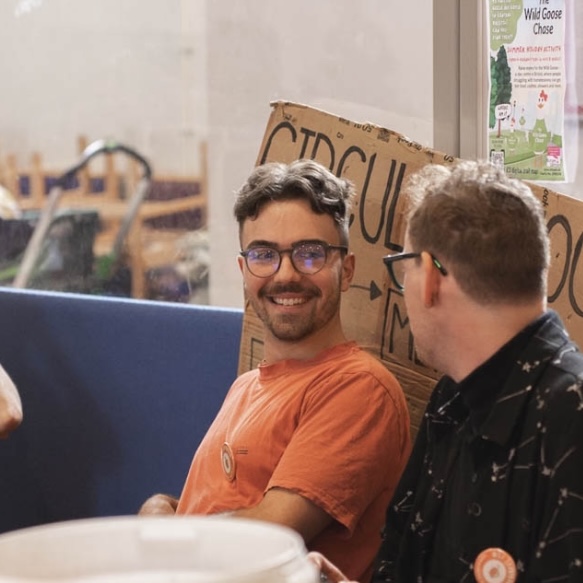Turn Food Waste into Fertile Soil with Bokashi Composting: A Step-by-Step Guide
- Alex Montgomery
- Mar 24, 2025
- 3 min read
Updated: Oct 14, 2025
In the heart of Bristol, a quiet composting revolution is underway. Across flats, community gardens, and schools, people are discovering a simple truth. Food waste isn’t rubbish; it’s potential.
At Generation Soil CIC, we’re closing the loop between food waste and soil regeneration through bokashi composting, a low-odour, microbe-powered process that transforms scraps into nutrient-rich living soil.

What Is Bokashi Composting?
Bokashi composting is a fermentation-based method that uses beneficial microorganisms to break down organic waste quickly, even meat, dairy, and cooked food.
Unlike traditional composting, bokashi doesn’t rely on oxygen or turning. Instead, it uses a microbial mix called bokashi bran (made from wheat bran, molasses, and effective microorganisms) to ferment food waste in an airtight container.
The result? No smells, no flies, no methane, just nutrient-dense, microbe-rich compost that feeds the soil and reduces household waste.

How Bokashi Composting Works
Collect your food scraps
Keep a small kitchen caddy or bokashi bin for fruit, veg, meat, bread, and leftovers.
Add bokashi bran
Sprinkle a handful of bran over each layer of waste. The microbes immediately begin breaking down organic matter.
Seal the bin
Keep it airtight. This creates the perfect environment for fermentation, not rotting.
Drain bokashi liquid (bokashi tea)
Every few days, drain off the liquid from the tap at the bottom.
Dilute it 1:100 with water and use it as a natural fertiliser for plants or to boost your compost heap.
Ferment, then bury
After two weeks, the waste will look pickled rather than decomposed.
Bury it in soil or mix it into a compost bin; it will break down fully within a few weeks, enriching the ground with nutrients and microbes.
This simple, odour-free process makes bokashi ideal for urban homes and community compost hubs alike.
Why Bokashi Is a Game-Changer for Cities
Traditional composting is effective but can be slow, space-intensive, and tricky in small urban environments.
Bokashi, however, offers several unique advantages for households and cities like Bristol:
Faster breakdown: food waste is ready for soil integration in as little as three weeks.
Odour-free and pest-free: no smells, no flies, and safe to do indoors.
More inclusive: it processes food that traditional composters reject, such as meat, dairy, bread, citrus, and even bones.
Improves soil health: fermented waste feeds beneficial microbes that strengthen soil structure and fertility.
Reduces carbon emissions: bokashi captures carbon in soil instead of releasing methane from landfill.
By using bokashi, we can turn kitchen waste into a climate solution, all from our own homes.
How Generation Soil Uses Bokashi in Bristol
At Generation Soil CIC, bokashi composting is at the core of our Bristol Living Compost Project.
We collect food waste from local households, cafés, and businesses, including Bruhaha Microbrewery, Square Food Foundation, and Cooking It Cookery School, and ferment it with bokashi microbes before combining it with local wood shavings.
This mixture creates a thriving compost ecosystem that we return to gardens, farms, and our two-acre food forest market garden.
By integrating bokashi composting with regenerative agroforestry and soil-building practices, we’re:
Restoring soil fertility naturally
Reducing reliance on chemical fertilisers
Building local food security and resilience
Creating a decentralised, community-led composting model
It’s proof that the circular food system can work at a neighbourhood scale:
Food waste → compost → food again.

How You Can Get Involved
Want to join the bokashi movement in Bristol? Here’s how you can start today:
Join our composting service. We provide collection for households, schools, and businesses across Bristol.
Book a workshop. Learn how to make and use bokashi bins, understand microbial science, and build living soil at home.
Volunteer with Generation Soil. Help us process food waste, run events, or regenerate land at our market garden.
Order living compost. Try our bokashi-powered compost made right here in Bristol.
Every bucket of food waste kept out of landfill helps us cut emissions, regenerate urban soil, and grow community.
Bokashi Composting and Climate Solutions
The microbes that drive bokashi aren’t just breaking down waste; they’re building climate resilience.
Healthy, microbe-rich soils capture carbon, store water, and support biodiversity.
When paired with community composting, bokashi becomes part of a local climate solution that empowers citizens to act directly.
Imagine a Bristol where every flat, garden, and business keeps its food scraps local, feeding back into the city’s green spaces and food forests. That’s the future Generation Soil is building.
Join the Bokashi Revolution
Food waste is not a problem; it’s the beginning of regeneration.
At Generation Soil, we’re working with Bristol residents to create a circular system where waste becomes living soil.
Join the Bristol Living Compost Project, attend a workshop, or start your own bokashi bin and be part of the movement transforming the city’s food system from the ground up.
Together, we can turn food waste into fertile soil, one bucket at a time.




Comments